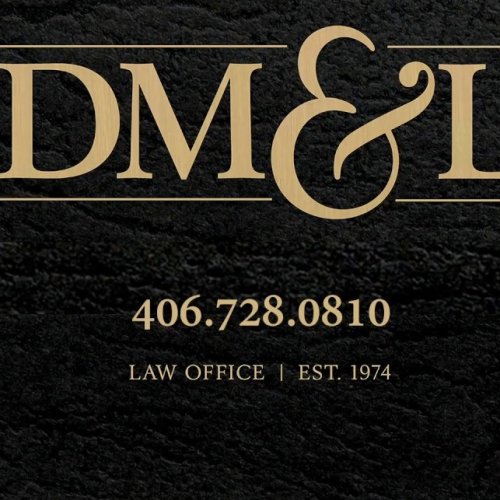Best Creditor Lawyers in Hamilton
Share your needs with us, get contacted by law firms.
Free. Takes 2 min.
List of the best lawyers in Hamilton, United States
About Creditor Law in Hamilton, United States
Creditor law in Hamilton, United States governs the relationship between borrowers and creditors. It deals with the rights and responsibilities of both parties, including issues related to debt collection, foreclosure, bankruptcy, and more.
Why You May Need a Lawyer
There are several situations where seeking legal help in creditor matters can be beneficial:
- If you are being harassed or unfairly treated by a creditor
- If you are struggling with debt and need advice on negotiation or restructuring
- If you have received a notice of foreclosure and want to explore your options
- If you are considering filing for bankruptcy and need guidance through the process
- If you are facing a lawsuit from a creditor and need representation
Local Laws Overview
Hamilton has specific laws that may impact creditor matters. Here are some key aspects:
- Debt Collection: Hamilton follows the Fair Debt Collection Practices Act, which prohibits certain debt collection practices and provides consumer protections.
- Foreclosure: The foreclosure process in Hamilton is regulated by both state and federal laws, and it is important to understand the timelines and requirements involved.
- Bankruptcy: Hamilton follows the bankruptcy laws outlined in the United States Bankruptcy Code, which governs the various bankruptcy chapters and the eligibility criteria for filing.
These laws are subject to change, and it is recommended to consult with a lawyer for the most up-to-date information.
Frequently Asked Questions
1. Can creditors garnish my wages in Hamilton?
Yes, under certain circumstances, creditors may be able to garnish your wages in Hamilton to recover outstanding debts. However, there are legal limitations on how much can be garnished and certain types of income may be exempt.
2. Are there alternatives to bankruptcy in Hamilton?
Yes, alternative options to bankruptcy in Hamilton include debt negotiation, debt settlement, and debt consolidation. These options should be evaluated with the assistance of a lawyer to determine the best course of action for your specific situation.
3. How long does foreclosure take in Hamilton?
The duration of the foreclosure process in Hamilton can vary depending on several factors, including the complexity of the case and any applicable state or federal laws. It is advisable to consult with a lawyer to understand the specific timeline in your situation.
4. How can I stop creditor harassment in Hamilton?
If you are being harassed by creditors in Hamilton, you can take several steps to stop the harassment. These include sending a written request to cease contact, recording phone conversations, and contacting a lawyer who can guide you through the appropriate legal actions.
5. Do I need a lawyer if I am summoned to court by a creditor?
It is highly recommended to seek legal representation if you are summoned to court by a creditor in Hamilton. A lawyer can help you understand your rights, formulate a defense strategy, and ensure your interests are protected throughout the legal process.
Additional Resources
Here are some helpful resources related to creditor law in Hamilton:
- Hamilton County Bar Association - www.hamiltoncountybar.org
- Consumer Financial Protection Bureau - www.consumerfinance.gov
- Legal Aid Society of Greater Cincinnati - www.lascinti.org
Next Steps
If you require legal assistance in matters related to creditor law in Hamilton, it is recommended to:
- Gather all relevant documents and information related to your case
- Research and contact reputable lawyers who specialize in creditor law
- Schedule consultations to discuss your case and evaluate your options
- Select a lawyer who best fits your needs and proceed with their guidance
- Follow their instructions and provide any requested documentation promptly
- Maintain open communication and keep your lawyer informed of any developments
Remember, every case is unique, and consulting with a lawyer will ensure you receive the most appropriate advice and representation based on your specific circumstances.
Lawzana helps you find the best lawyers and law firms in Hamilton through a curated and pre-screened list of qualified legal professionals. Our platform offers rankings and detailed profiles of attorneys and law firms, allowing you to compare based on practice areas, including Creditor, experience, and client feedback.
Each profile includes a description of the firm's areas of practice, client reviews, team members and partners, year of establishment, spoken languages, office locations, contact information, social media presence, and any published articles or resources. Most firms on our platform speak English and are experienced in both local and international legal matters.
Get a quote from top-rated law firms in Hamilton, United States — quickly, securely, and without unnecessary hassle.
Disclaimer:
The information provided on this page is for general informational purposes only and does not constitute legal advice. While we strive to ensure the accuracy and relevance of the content, legal information may change over time, and interpretations of the law can vary. You should always consult with a qualified legal professional for advice specific to your situation.
We disclaim all liability for actions taken or not taken based on the content of this page. If you believe any information is incorrect or outdated, please contact us, and we will review and update it where appropriate.








